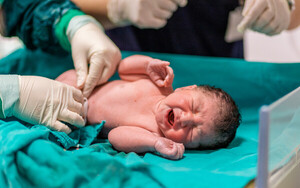Concerns are mounting among obstetricians and gynecologists that the collapse of the delivery infrastructure will be difficult to prevent unless the government changes its policy direction.
In a statement on Tuesday, the Korean Association of Obstetricians and Gynecologists (KAOG) criticized the current situation as “too lethargic and gloomy.” It then cited some systems, such as the comprehensive fee-for-service system for cesarean sections and the regional fee-charging system that excludes Seoul and other metropolises, as typical examples of systems that do not recognize the reality of childbirth.
The association said it was particularly disappointed with the results of the comprehensive fee system study. “The comprehensive fee system cost study confirms how the government is indifferent to the reality of obstetrics and gynecology, pushing for murderous low-fee policies.”
“We were hopeful that the comprehensive fee system study findings would benefit maternity hospitals in the long term. However, it is very disappointing that they do not reflect the reality of the situation,” the association said. “Given the 12.8 percent inflation rate and rising labor costs over the past four years, we call for a comprehensive fee increase of at least 10-15 percent for cesarean sections based on valuation standard, which is more important than cost-effectiveness.”
The exclusion of Seoul and other metropolises from the system, which adds 550,000 won ($399) to the regional fee for each delivery, has led to the rapid collapse of their delivery infrastructure.
A leading maternity hospital in Gwangju closed its door last Sept. 30 due to the declining birthrate. A delivery hospital in the Seoul metro region, which ranked first nationwide in terms of delivery number in 2018, also decided to close last Sunday, according to the association.
“The exclusion of Seoul and other metropolises from the regional apportionment system has made it difficult to maintain delivery rooms in the region. This should be corrected,” KAOG said. “The delivery infrastructure is collapsing in rural areas, the greater Seoul area, and other metropolises, and we demand special measures to prevent its collapse, including support without regional discrimination.”
The association asked who should be responsible for creating such a poor practice environment, marked by “rampant medical lawsuits and murderously low fees.”
“The government must change its thinking and attitude if it wants to stop the collapse of the delivery infrastructure. If things don’t change, the collapse of the delivery infrastructure will accelerate,” it said.

